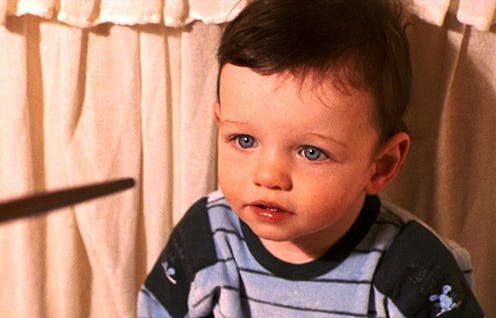
In the Harry Potter narrative, baby Harry's first miraculous survival is explained by one awesome and powerful saving grace: love. That being said, if the power of love could save someone from a Killing Curse, there would probably be a lot more people running around with jagged rebound scars on their bodies. Readers discover later on that it wasn't just love, but the nature of Lily's sacrifice, that saved Harry — that, and the fact that Voldemort unintentionally turned Harry into a horcrux. But what actually saved Harry Potter from death in Deathly Hallows?
After Harry manages to survive Voldemort's Killing Curse a second time, Dumbledore tells Harry yet again that he was yet again saved by love — but when you examine the conditions a little more closely, you'll notice that Dumbledore might have (Cornelius) fudged the truth a bit. ("Gasp! Shock! Dumbledore has never been anything but honest!!!" said nobody.) That's where Reddit user WippitGuud's theory comes in.
Everyone goes by the explanation in Deathly Hallows given by Dumbledore as to why Harry didn't die at the end of the book. He says: because Voldemort took Harry's blood to recreate his body, Lily's protection kept Harry from dying. This statement does not work with the evidence of the event.
- When Harry was hit by the killing curse as a baby, it rebounded and killed Voldemort, necessitating that he create a new body. This did not happen the second time.
- When Harry was hit by the killing curse as a baby, it left a visible mark. This did not happen the second time.
- To destroy a Horcrux, the container must be destroyed.
Three is the important one here. Harry needed to be destroyed for the part of Voldemort's soul to be killed. Had Lily's protection been responsible for the survival, he would not have died. Hence that portion of soul would also not have died. So, Harry must have been killed.
So how exactly did he live? WippitGuud posits that it wasn't just Lily's protection, but the fact that Harry was, at this point the master of all of the Deathly Hallows — aka, the master of death. He already possessed the stone and the cloak.
Because Harry chose to not defend himself, the Wand was not defeating Harry, so its allegiance did not change. Dumbledore even comments on it, "And that, I think, will have made all the difference." Had he tried to duel, he would've lost allegiance to the wand when he lost, and simply died.
In that sense, Harry wasn't protected by his mother's love, so much as the fact that he had made a specific choice not to seek power that gave him all the power in the world. That isn't to say that love isn't still a saving grace in the end, as Harry demonstrably uses the same power of love and sacrifice to protect his peers, the way that Lily once protected him. After Harry is resurrected, Voldemort's attacks can't hurt the people at Hogwarts, because he has made a similar sacrifice. The role of love is in no way devalued by this theory — but we also see that the second time around, there was no way Lily's love could have affected whether or not Harry lived or died. The true power to bring Harry back came from his unwillingness to fight death himself, the way Lily was unwilling to fight it for his sake 16 years before.
In any case, this does put to rest the question of whether or not Harry actually "died" at the end of Deathly Hallows. In examining these conditions, he most certainly did — thankfully for the fandom (and for all the babies in Harry Potter and the Cursed Child), he survived to tell the tale.
Images: Warner Bros